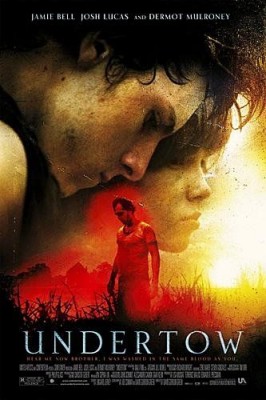|
Undertow
David
Gordon Green is the type of director that revels in simplicity.
Sounds easy enough, but it is far more complex than that.
The complication comes from the manner in which he approaches
the simplistic, and that is to treat it as if it were the
only thing that truly mattered in the universe. Undertow
marks his third film, all of which feature the rural landscapes
of the South as their backdrop for tonal explorations of
adolescent growth, and the pains associating with expression
of feeling.
Everyone
has been there. That consuming sense of urgency that extends
beyond the means of one’s own flesh, as if the skin
would tear wide open if it refused the growth spurts imposed
upon it.
Strikingly,
with each installment Green seems to raise the ante a bit,
and delve deeper into the true horror and beauty that makes
up humanity. As with George Washington and All
the Real Girls, Green explores the complexities of
expression in a beautifully understated wash of mood and
ambiance, never crossing the line into the obscure, but
dwelling fastidiously in the ebb and flow of the surreal.
This
time around, the focus is on two brothers. Chris (Jamie
Bell), the rebellious older sibling, provides us with our
glimpse into his world. We observe aspects of his life in
snippets, sometimes without the details preceding or following
specific events. It’s almost as if he is recalling
these memories for us to witness firsthand.
It’s
said at one point that “sometimes it’s the strange
moments that stick,” and this is profound. Green emphasizes
this with aptly placed freeze frames throughout the film,
framing incidents as they occur and etching them onto the
screen as they would in Chris’ mind.
As Chris
inches his way deeper into trouble, his younger brother
Tim (Devon Allen), seems to be heading for danger in his
own way. Frail and bordering malnourishment, Tim refuses
to eat the food prepared for meals, but secretly devours
mud and paint chips, to the point of making himself physically
ill.
The
third in the family is paterfamilias John (Dermot Mulroney),
a quiet yet stern man who seems at odds with Chris’
rebellious nature, yet fails to see how his affection for
Tim seemingly exacerbates the problem. Being older and more
physically fit, Chris is handier around the house tending
to the pigs and mending the roof while Tim is left to poison
himself.
John
mourns the loss of his wife, and at one point explains that
following her death he decided to uproot the family and
move to the middle of nowhere to “live like hermits.”
The hint of a secret, some sort of regret from the past,
is intertwined with remorse over his loss, and it leads
to bigger issues when his own brother Deel (Josh Lucas)
arrives on parole from prison.
With
his arrival, Deel opens up old wounds and also peaks the
interests of Chris, who seems keyed into the skeletons in
his father’s closet surrounding a collection of priceless
Mexican gold coins. The dynamic between both sets of siblings
are intended to compliment one another, yet Green has woven
a thread of morality into the film early on which underlines
the developments between all involved.
This
“message” is far more subtle and in line with
Green’s intentions than merely inflicting yet another
life lesson on his audience. In the opening sequences of
Undertow, Chris’ feelings for a young woman
he fancies gets him into trouble and he ends up skewering
his foot on a board with an errant nail. This
is naturally cringe-inducing, but the ingredients used in
this sequence resonate in small ripples throughout the rest
of Chris’ arc. His tenacity to stand firm is depicted
in the manner in which he walks away with the board still
attached to his foot.
Chris’
disruption of Tim’s birthday party is something he
defends when his father calls him on his actions. He protests
John’s favoring of Tim, and spews hurtful truths that
are both intended and typical of teenagers his age, yet
the scenes never succumb to melodrama.
What
comes of these sequences is told through actions, but not
as one might expect. After the police return the board in
question to Chris, he decides to make use of the wood itself
by fashioning a wooden airplane to give to Tim for his birthday.
The gift is both redemption and apology incarnate, and illustrates
his feelings for his sibling despite the disdain he may
feel about his own treatment in the house.
It would
be a mistake to delve deeper into what unfolds for Chris
and Tim, because the film deserves to be seen, not dictated.
Those
willing to take a chance on Undertow will be welcomed
by a pastiche of memory, both sullied with dirt and grain,
yet beautifully rendered in fondness and affection. Lucas
and Mulroney are surprisingly cunning in the film, wrestling
with a past that each feels justified in while Bell and
Allen manage to steal the show with their sincerity. Included
in Green’s many strengths is his ability to coax intelligent
and cogent performances from his youthful actors.
Despite
the lack of rare gold coins in most families, everyone is
sure to have experienced differences of opinion regarding
various events within a family history that have either
divided or united members together. Green has managed to
fuse these tiny dramas together into something larger in
scale, affecting all of humanity individually and universally
at once.
Rating:

|






